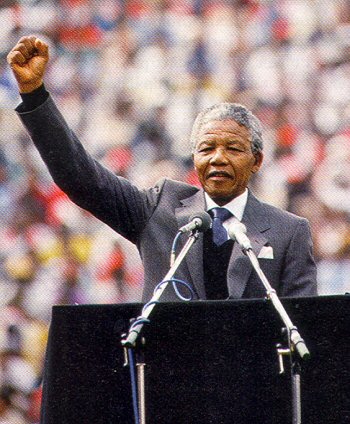
Nelson Rolihlahla Mandela(1918-)
Nelson Rolihlahla Mandela was born on 18 July 1918 in the small village of Mvezo, on the Mbashe River, district of Umtata in Transkei, South Africa. His Father named him Rolihlahla, which means "pulling the branch of the tree", or more colloquially "troublemaker." The name Nelson was not given until his first day at school.
Nelson Mandela's father, Gadla Henry Mphakanyiswa, was the chief "by blood and custom" of Mvezo, a position confirmed by the paramount chief of the Thembu, Jongintaba Dalindyebo.
Although the family is descended from Thembu royalty (one of Mandela's ancestors was paramount chief in the 18th century) the line had passed down to Mandela through lesser 'Houses', rather than through a line of potential succession. The clan name of Madiba, which is often used as a form of address for Mandela, comes from the ancestral chief.
In 1962 Nelson Mandela was smuggled out of South Africa. He first attended and addressed the conference of African nationalist leaders, the Pan-African Freedom Movement, in Addis Ababa.
From there he went to Algeria to undergo guerrilla training, and then flew to London to catch up with Oliver Tambo (and also to meet members of the British parliamentary opposition). On his return to South Africa, Mandela was arrested and sentenced to five years for "incitement and illegally leaving the country".
At the end of his four hour statement to the court Nelson Mandela stated: "During my lifetime I have dedicated myself to this struggle of the African people. I have fought against white domination, and I have fought against black domination. I have cherished the ideal of a democratic and free society in which all persons live together in harmony and with equal opportunities. It is an ideal which I hope to live for and to achieve. But if needs be, it is an ideal for which I am prepared to die."
Key words: politician national revolution
曼德拉(1918-)
納爾遜•羅利赫拉赫拉•曼德拉( Nelson Rolihlahla Mandela )1918年7月18日出生于南非特蘭斯凱一個大酋長家庭,先后獲南非大學(xué)文學(xué)士和威特沃特斯蘭德大學(xué)律師資格,當(dāng)過律師。曼德拉自幼性格剛強(qiáng),崇敬民族英雄。他是家中長子而被指定為酋長繼承人。但他表示:“決不愿以酋長身份統(tǒng)治一個受壓迫的部族”,而要“以一個戰(zhàn)士的名義投身于民族解放事業(yè)”。他毅然走上了追求民族解放的道路。
1944年他參加南非非洲人國民大會(簡稱非國大)。1948年當(dāng)選為非國大青年聯(lián)盟全國書記,1950年任非國大青年聯(lián)盟全國主席。1952年先后任非國大執(zhí)委、德蘭士瓦省主席、全國副主席。同年年底,他成功地組織并領(lǐng)導(dǎo)了“蔑視不公正法令運動”,贏得了全體黑人的尊敬。為此,南非當(dāng)局曾兩次發(fā)出不準(zhǔn)他參加公眾集會的禁令。
1961年6月曼德拉創(chuàng)建非國大軍事組織“民族之矛”,任總司令。1962年8月,曼德拉被捕入獄,當(dāng)時他年僅43歲,南非政府以政治煽動和非法越境罪判處他5年監(jiān)禁。1964年6月,他又被指控犯有以陰謀顛覆罪而改判為無期徒刑,從此開始了漫長的鐵窗生涯,在獄中長達(dá)27個春秋,他備受迫害和折磨,但始終堅貞不屈。1990年2月11日,南非當(dāng)局在國內(nèi)外輿論壓力下,被迫宣布無條件釋放曼德拉。同年3月,他被非國大全國執(zhí)委任命為副主席、代行主席職務(wù),1991年7月當(dāng)選為主席。1994年4月,非國大在南非首次不分種族的大選中獲勝。同年5月,曼德拉成為南非第一位黑人總統(tǒng)。1997年12月,曼德拉辭去非國大主席一職,并表示不再參加1999年6月的總統(tǒng)競選。1999年6月正式去職。
以上就是關(guān)于曼德拉的SAT寫作素材的全部內(nèi)容,包括了英語和漢語兩個部分的內(nèi)容。大家可以在備考自己的SAT寫作考試的時候,進(jìn)行適當(dāng)?shù)膮⒖肌?/p>











